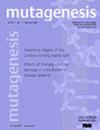发现胰腺导管腺癌新易感性位点的多效性扫描
IF 2.5
4区 医学
Q3 GENETICS & HEREDITY
引用次数: 0
摘要
多向变异(即影响一种以上表型的基因多态性)通常与癌症风险有关。十年前,一项与胰腺导管腺癌易感性有关的多向变异扫描研究获得成功。然而,在过去十年中,对人类多个性状进行的遗传关联研究大大增加了已知多向变异的数量。根据已与至少一种性状相关的变体与其他性状相关的概率更高这一假设,本研究对至少一项基因组广泛关联研究(GWAS)报告的与至少一种人类性状相关的 61,052 个变体进行了测试,包括两个阶段(发现和验证),共包括 16,055 例胰腺导管腺癌(PDAC)病例和 212,149 例对照。两个阶段的荟萃分析表明,两个位点(10q21.1-rs4948550(P=6.52×10-5)和 7q36.3-rs288762(P=3.03×10-5))可能与 PDAC 风险有关。10q21.1-rs4948550显示出高度的多义性,它也与结直肠癌风险相关,而7q36.3-rs288762位于Sonic Hedgehog(SHH)基因上游28558个碱基对处,SHH基因参与了细胞分化过程和PDAC的发病机制。总之,经多重检验校正后,没有一个单核苷酸多态性(SNPs)显示出正式的统计学意义上的关联。然而,考虑到它们的多向性以及与包括结直肠癌在内的各种人类特征的关联,与 PDAC 风险关联最好的两个 SNPs 值得通过精细图谱和特别功能研究进行进一步调查。本文章由计算机程序翻译,如有差异,请以英文原文为准。
A pleiotropy scan to discover new susceptibility loci for pancreatic ductal adenocarcinoma
Pleiotropic variants (i.e., genetic polymorphisms influencing more than one phenotype) are often associated with cancer risk. A scan of pleiotropic variants was successfully conducted ten years ago in relation to pancreatic ductal adenocarcinoma susceptibility. However, in the last decade, genetic association studies performed on several human traits have greatly increased the number of known pleiotropic variants. Based on the hypothesis that variants already associated with a least one trait have a higher probability of association with other traits, 61,052 variants reported to be associated by at least one genome wide association study (GWAS) with at least one human trait were tested in the present study consisting of two phases (discovery and validation), comprising a total of 16,055 pancreatic ductal adenocarcinoma (PDAC) cases and 212,149 controls. The meta-analysis of the two phases showed two loci (10q21.1-rs4948550 (P=6.52×10-5) and 7q36.3-rs288762 (P=3.03×10-5) potentially associated with PDAC risk. 10q21.1-rs4948550 shows a high degree of pleiotropy and it is also associated with colorectal cancer risk while 7q36.3-rs288762 is situated 28,558 base pairs upstream of the Sonic Hedgehog (SHH) gene, which is involved in the cell differentiation process and PDAC etiopathogenesis. In conclusion, none of the single nucleotide polymorphisms (SNPs) showed a formally statistically significant association after correction for multiple testing. However, given their pleiotropic nature and association with various human traits including colorectal cancer, the two SNPs showing the best associations with PDAC risk merit further investigation through fine mapping and ad hoc functional studies.
求助全文
通过发布文献求助,成功后即可免费获取论文全文。
去求助
来源期刊

Mutagenesis
生物-毒理学
CiteScore
5.90
自引率
3.70%
发文量
22
审稿时长
6-12 weeks
期刊介绍:
Mutagenesis is an international multi-disciplinary journal designed to bring together research aimed at the identification, characterization and elucidation of the mechanisms of action of physical, chemical and biological agents capable of producing genetic change in living organisms and the study of the consequences of such changes.
 求助内容:
求助内容: 应助结果提醒方式:
应助结果提醒方式:


